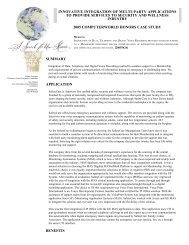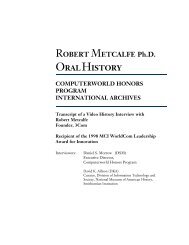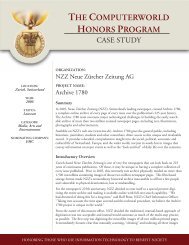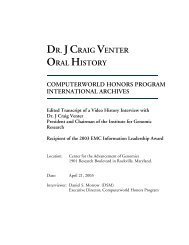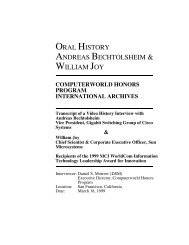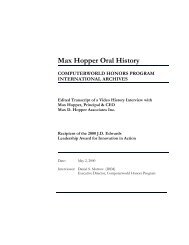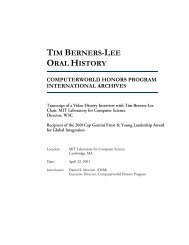NATHAN MYHRVOLD PhD ORAL HISTORY - The Computerworld ...
NATHAN MYHRVOLD PhD ORAL HISTORY - The Computerworld ...
NATHAN MYHRVOLD PhD ORAL HISTORY - The Computerworld ...
Create successful ePaper yourself
Turn your PDF publications into a flip-book with our unique Google optimized e-Paper software.
So Office 97, our office productivity package, it includes word processing and spread<br />
sheet data base that has a grammar checker developed by our national language<br />
group. It’s the best grammar checker in the world. It’s the first one that corrects<br />
your grammar while you type. And I would like to highlight this one because they<br />
call these programs word processors, but until Office ‘97, they weren’t word<br />
processors, they were character processors. <strong>The</strong>y helped you arrange characters on a<br />
page and get them lined up, but the program had no understanding that those strings<br />
of characters were words, that those words were organized into sentences and<br />
paragraphs, and that there was structure meaning. What we need the computer to<br />
be is not just your scribe in helping you remember where the characters go.<br />
Computers should be your copy editors, your partner in writing that helps you<br />
understand the deep structure of language and it helps apply that to something.<br />
That’s really what it should be about, and that’s what it’s going to be about because<br />
we have a very strong set of research efforts supporting our product. This is true for<br />
a whole bunch of other projects, and our operating systems in games, every part of<br />
the company has really benefited, so we have both examples of doing great work and<br />
hiring great people, and having an effect with products.<br />
DA: That’s very interesting to hear your strategy. I’ve studied research<br />
organizations for a long time. One of the problems usually is the hand off. When<br />
the researcher develops this idea, he thinks it’s great, he publishes it, or hands it off,<br />
or writes a reports, and he goes to the next idea. And some people say, “No, you<br />
need to keep at the research, keep with the idea through product development, or<br />
use a certain kind of plan.” What is your plan for making that transition between<br />
research and product development?<br />
NM: I am proud to say we have no process for this. Most of the best things in life<br />
don’t have a formal process. Most people meet their spouse in some ad hoc basis.<br />
<strong>The</strong>re’s not some formal process where you apply, and you do this, and you do that.<br />
Most breakthroughs, although they may occur by people that have degrees, aren’t as<br />
a result of completing a certain number of degree requirements and then the<br />
breakthrough happens. And transferring technology from a research group over to<br />
products isn’t something that happens in any single mode either, at least not here.<br />
Sometimes it happens because Bill Gates or I will be reviewing a product group. We<br />
will know it went on into research and say, “Hey, you should go talk to those<br />
people.” Sometimes it happens the other way around. We tell the researchers, “You<br />
should go see if someone wants to use this.” But it also happens because people are<br />
friends. <strong>The</strong>y get together in the hallways, or someone says, “Hey, let’s have lunch,<br />
and let’s discuss it.”<br />
Nathan Myhrvold<br />
Oral History<br />
34



